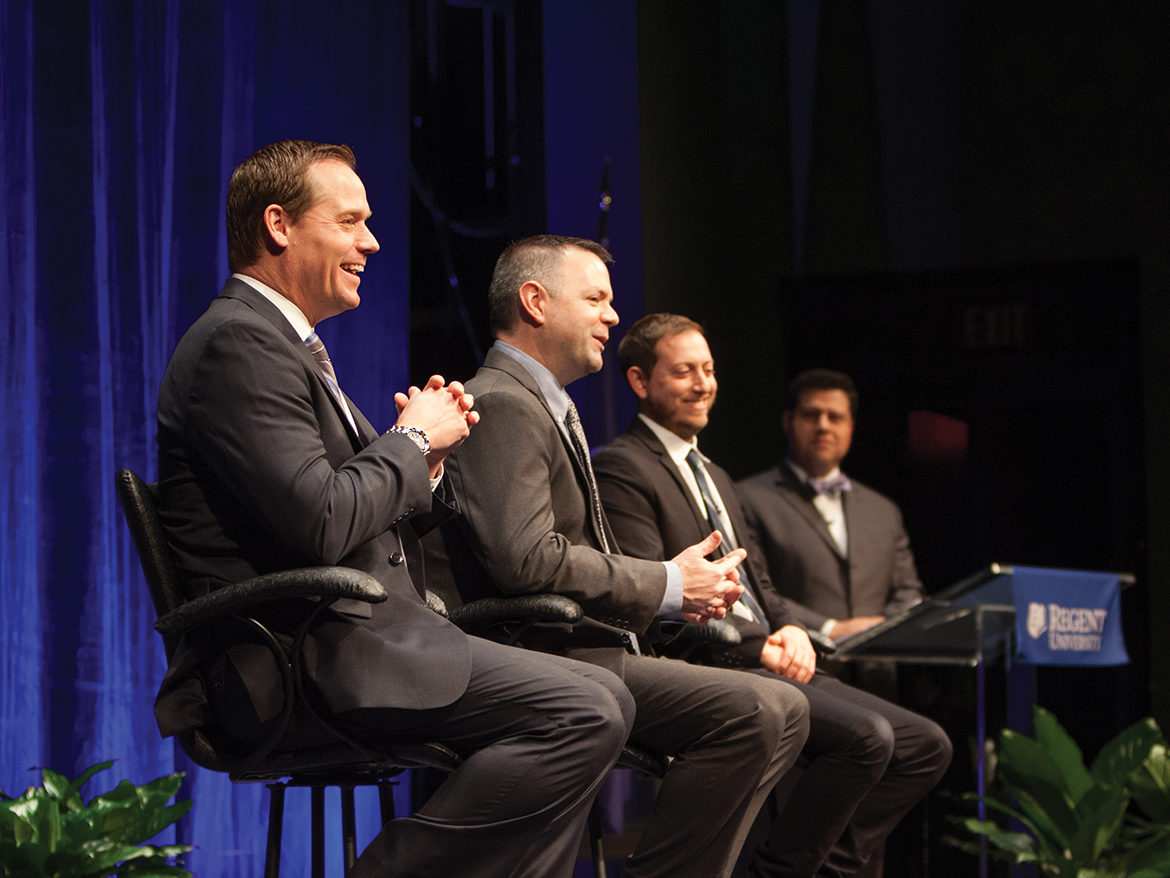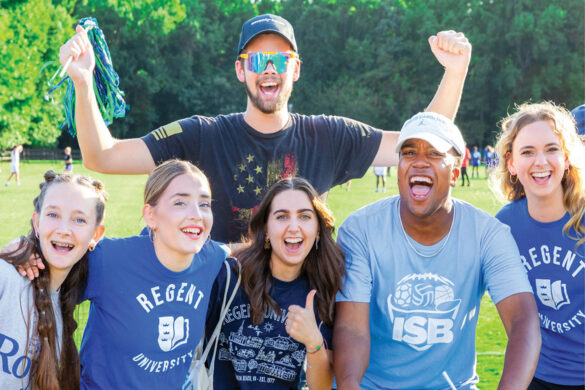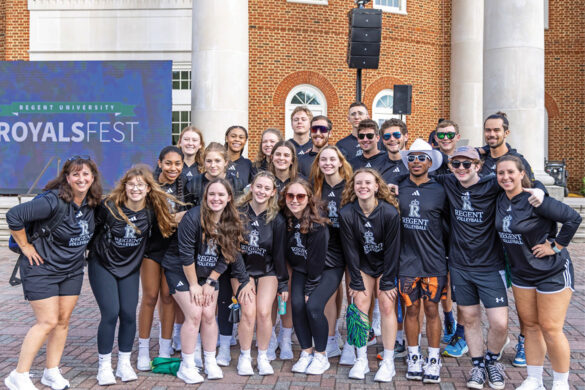Cybersecurity is a rapidly expanding and increasingly important field. As computer and network hacking continues on a wide, multinational scale with no end in sight, protecting individuals, businesses, governments and institutions has become a primary investment priority, especially for Regent University.
In October 2017, Regent’s Institute for Cybersecurity unveiled its Cyber Range, a state-of-the-art facility with cutting-edge technology that offers training to students, as well as to business and military leaders. This groundbreaking simulator enables users to acquire the highest level of skills needed for careers in cybersecurity.
Prior to cutting the ribbon and officially opening the Cyber Range this past fall, the university’s founder, chancellor and CEO, Dr. M.G. “Pat” Robertson, said: “Regent’s new Cyber Range will address the nation’s need for thousands of additional cybersecurity experts to defend government and commercial networks from cyberattacks.”
As part of a strategy to expand the university’s commitment to pioneering this vital field of study, Regent recently hosted its first-ever cybersecurity summit on campus. The Feb. 15 event included a series of informative lectures and panel discussions with nearly a dozen industry leaders inside Regent Theatre. It concluded with an Executive Leadership Series luncheon at Founders Inn & Spa, featuring an eye-opening presentation by Kevin Mitnick, the world’s most famous computer hacker.
“It’s really an event toward which we’ve been working for since 2015, when we began to launch a cybersecurity educational initiative,” explains Dr. Gerson Moreno-Riaño, Regent’s executive vice president for academic affairs. “People tend to have conversations about cybersecurity in silos, either industry silos, organizational silos, and no one’s speaking together in sharing information and collaborating. So we knew it was an opportunity for us to bring the Hampton Roads region together and also to provide thought leadership.”
Session one of the summit featured three hours of keynote addresses, a question-and-answer session and panel discussions. Some of the notable speakers and participants included industry leaders from Google, Cybint, the Federal Bureau of Investigation, GE Healthcare, Eastern Virginia Medical School and summit sponsors Hewlett-Packard Enterprise and Grimm, a security engineering and consulting firm.
“Attacks are outpacing our ability to defend against them,” said Grimm’s COO Ryan Leirvik. “There’s not a broad enough workforce that can address that. … And universities are really the place to go to help supplement that experience of learning and the educational foundational pieces that are needed.”
“According to recent research, 51 percent of organizations said they had a major problematic skills shortage; and this is only getting worse,” said Ian Green, security and privacy engineering manager at Google. “Even organizations with well-stocked cybersecurity teams, such as my own, are struggling to keep up with the demands of an increasingly connected world.”
“51 percent of organizations said they had a major problematic skills shortage; and this is only getting worse.”
— Ian Green, Google
“We need a higher level of skilled labor,” he insisted. “That’s the only way we’re going to be able to tackle these problems.”
According to Leirvik, another major challenge is that the industry is still in its infancy: “When you look at it from a global perspective, there’s still not a full understanding of what cybersecurity is. And if there’s not a good understanding of it, then there’s not a good way of managing it.”
“The gap really comes down to not having a full comprehensive approach,” Grimm CEO Brian DeMuth explained. “From degree seeking to extended learning to certifications to immersive environments, like cyber ranges, they’re all being used. [But] they’re not being used in a comprehensive way, and that’s a challenge.”
Robert Cochran, a program director with the FBI’s cyber division, said education at university, community and business levels is a key component of cybersecurity success: “Part of me doing my job is spending time talking about these things. The audience may take something away that allows them to protect themselves … a little bit better or they go back to their company with some ideas.”
Cochran also believes that the more Regent and other institutions hold cybersecurity summits, seminars or similar events, the better it will be for the entire industry: “I see bad guys … and I can tell you what (happens) when bad guys do things to networks and how much it costs people. So, when I have those conversations, especially within my local community, I hope that I’m having a little bit of an impact.”
Session two of the university’s inaugural cybersecurity summit saw attendees make their way from Regent Theatre to Founders Inn & Spa for the sold-out event: “Live Hacking With Kevin Mitnick.” Known as the world’s most famous hacker, Mitnick served five years in prison after being convicted of several cyber crimes. In fact, the day he appeared at Regent marked the 23rd anniversary of his FBI arrest.
Formerly on the FBI’s Most Wanted list, Mitnick’s illegal hacking days are far behind him. Today, as CEO of Mitnick Security Consulting and CHO (chief hacking officer) of KnowBe4, he helps produce critically acclaimed security-awareness training programs. Also a best-selling author, Mitnick teaches organizations and individuals how to protect their information and themselves from harm.
“In my case, it was never about the money. It was always about the thrill and the excitement,” he told Impact. “I started hacking from a passion of wanting to know about security and for the puzzle of getting around things. People are so fortunate today that they have these opportunities at a university level. … Even when I was caught in 1995, there was no curriculum for that.”
With CBN News Senior Reporter and Regent alumnus George Thomas serving as moderator, Mitnick performed what he calls a “technology magic show.” The presentation, which one Regent cybersecurity student described as “terrifying,” demonstrated just how easy it is to compromise people and institutions.
Cybersecurity experts like Mitnick agree that one of the most important components of cybercrime prevention is preparation. But computer worms, malware, spyware, ransomware and other threats are presenting increasingly significant challenges on a global scale that demand an appropriately aggressive response. In a virtual world filled with “bad actors,” Moreno-Riaño believes that Regent is strategically placed to equip students to fill an ethical void that currently exists in the industry.
“Oftentimes, people will think about technology as being morally neutral,” he said. “It’s a very contested space – no clear rules, no clear law in the cybersecurity world. But everyone seems to know when someone’s doing something wrong. So … I think one of the key things we bring to this discussion is the importance of a core moral vision of what’s good and what is right in this space.”
For more information about Regent University’s Institute for Cybersecurity, call 757.352.4215 or visit regent.edu/cyber. To pursue a cybersecurity degree through Regent, visit regent.edu or call 800.373.5504.












